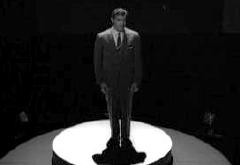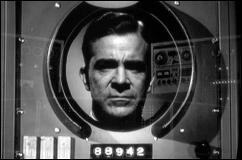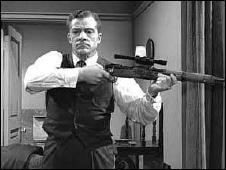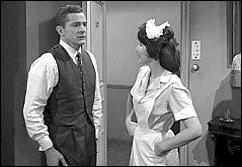Sun 25 May 2014
A TV Review by Jonathan Lewis: THE TWILIGHT ZONE “No Time Like the Past” (1963).
Posted by Steve under Reviews , TV Science Fiction & Fantasy[13] Comments
“NO TIME LIKE THE PAST.” An episode of The Twilight Zone, CBS, 7 March 1963 (Season 4, Episode 10). Dana Andrews, Patricia Breslin, Malcolm Atterbury. Radio adaptation: The Twilight Zone Radio Dramas, syndicated, circa 2002-2003, starring Jason Alexander.
“No Time Like The Past” is a Twilight Zone original series episode starring Dana Andrews (Laura, Where the Sidewalk Ends) as Paul Driscoll, a time-traveling physicist who comes to realize that, no matter how much you may want to, you simply can’t change the past. It’s one of those Twilight Zone episodes, which, apart from the somewhat clunky-looking scientific equipment one sees in beginning, does not seem remotely dated.
Indeed, the plot of “No Time Like The Past” and its theme of fatalism seem as timely as ever. That is one reason why Jason Alexander’s (Seinfeld) portrayal of Driscoll in the radio and audio drama version works so well.
We begin with Paul Driscoll (Andrews) in conversation with his colleague, Harvey (Robert F. Simon). They’re in a laboratory. Driscoll is standing in a crude time machine that he invented. Light and shadow play prominent roles, both literally and figuratively, in this scene. A man of both academic knowledge and unbridled humanism, Driscoll has an incredibly bleak view of the twentieth-century and he’s not remotely reluctant to make his views crystal clear:
It’s Driscoll’s intention to travel backward in time so as to change the present. He chooses three destinations: Hiroshima, in order to evacuate citizens before the atomic bomb is dropped; Nazi Germany before World War II, so he can assassinate Hitler; and on board the Lusitania, to halt the American entrance into the First World War. (In the radio play, Driscoll visits the same three points in time but in reverse order.) In all three situations, he fails to complete his task. He returns, disappointed, to the present and once again meets up with Harvey in the laboratory.
Driscoll now has a new plan. Rather than trying to change the past, he opts for living in it. Specifically, he wants to go back to 1881 and live in Homeville, Indiana where he can enjoy band concerts and lemonade. He’s read a book about the Midwest in the nineteenth-century and decides he wants to live in simpler times, before world wars and atom bombs. His naivety is galling.
When Driscoll gets to Homeville, he soon realizes that the past may not be all that great either. He ends up living in a boarding house with an armchair warrior who advocates for American imperialism in East Asia and, within a couple of days, President James Garfield is shot. Complicating matters is the fact that he begins to have romantic feelings for a schoolteacher, Abigail Sloan (Patricia Breslin) but soon realizes that he can’t do anything about it, lest he change the course of History.
Things get even worse for Driscoll when he realizes that some of Sloan’s schoolchildren are going to die in a fire. He read about it in the history book he carries with him. A man divided against himself, he can’t decide if he should intervene. In a sadly ironic twist of fate, Driscoll inadvertently ends up causing the very historical event he intended to stop. One of the perils of time travel, no doubt. Driscoll finally accepts that the past, as Harvey told him all along, is indeed inviolate.
Dana Andrews, best known for his film work in the 1940s, skillfully conveys the conflicted emotions the hopelessly tormented Driscoll. He convincingly portrays a man who is angry and sentimental, fearful and hopeful. In the slightly modified radio show version, Jason Alexander successfully pulls off the quite difficult feat of bringing this episode to life without the benefit of visuals. Alexander’s voice acting never once reminds you of his portrayal of George Costanza on Seinfeld.
In conclusion, “No Time Like The Past” is a classic Twilight Zone episode that stands up to the test of time. The themes of nostalgia, sentimentalism, and wishing one could change the past so as to change the present remain poignant today.
While some contemporary listeners might be less familiar with the Lusitania than with the Second World War, the points in time that Driscoll visits remain alive in the American public consciousness. One could imagine a future reworking of the script to include references to the Vietnam War and to 9/11, but that might have to wait another couple of decades. It’s an episode both worth watching and listening to.
NOTE: The TV episode can be watched in its entirety on IMDb here.





May 25th, 2014 at 11:03 am
This seems like not only heavy going, but wrong-headed and heavy. 1. Hitler. Not the problem — Germany was. Bombing Hiroshima saved our lives. No pity for the enemy. A war was started and concluded. The Japanese were horrible. A little research into prisoner of war camps and forced marches will provide verification. As for the Lusitania, very likely the most important event in history after the Resurrection, without American participation those great Germans would have been victorious. Our disgrace, was Woodrow Wilson keeping the United States out of the war until almost too late. Otherwise, Dana Andrews was an actor we welcome.
May 25th, 2014 at 11:17 am
Should be ‘wrong headed’ and ‘the most important event ‘ … Sorry for the error. Rod Serling not a favorite here.
May 25th, 2014 at 12:54 pm
I’ve made the corrections, Barry. I’m not a great fan of Rod Serling, either, but I recognize his importance in bringing a lot of science fictional ideas into the consciousness of the general public at the time. As a long time SF fan — of about ten years standing in 1963 — I also found his stories over-expounding the obvious, and I confess to never have watched the series very often. But neither did I think much of STAR TREK while it was on the first time around — equally guilty of the same sin of dwelling overlong on ideas that had been around the SFnal world for quite a while. But both series have stood the test of time, and I can watch both and enjoy them both now for what they are, and what they were then.
May 25th, 2014 at 1:35 pm
Steve,
Sure to all you have written. To expand on the Lusitania/Resurrection comparison, not at all a religious thought, but an observation that goes to the numerous lasting effects historically. The ripple effect from the sinking includes, but not limited to, the Untied States becoming the dominant world power, the middle east as it exists today, and of course ultimately the Second War. No sinking — and who knows.
May 26th, 2014 at 2:14 pm
Can’t disagree on Serling, but you can’t deny his importance either. Agree too that the Lusitania was far less important in pushing us into WWI than the Zimmerman telegram trying to persuade Mexico to invade and keep us too busy to fight in Europe. There was a time before those two incidents though that opinion in this country was pretty well divided between pro allies and pro German though our policies were leaned toward the allies if only because of language and culture.
The science here is interesting because at the time the big theory extant about time travel was that anything you did would alter history (Heinlien’s “By His Bootstraps” and Bradbury’s “Sound of Thunder”), but since then science has come around that the past cannot be altered, that the universe won’t allow a paradox, therefore anything you do in the past creates and alternate future, but in an alternate universe, while your universe continues the same.
This is more simplistic than that, but still turns out to be closer to modern science than the more popular concept, and it is a theme Serling uses more than once, though I suspect more in line with the idea that no matter what you do you can’t change anything than scientific theory.
Another war would likely have happened with or without Hitler, but the Holocaust would not have. Without the fanaticism Hitler inspired the Nazi movement would likely have gone the way of British and American fascist movements, and while war would have still been likely the German military would not have wasted resources on death camps and genocide whatever other atrocities they committed. That said, I don’t excuse the German people, just admit without Hitler leading them by a ring in their nose they probably would not have gone there.
As for the Japanese atrocities, prejudice worked for them in this area because we didn’t hold them to the same standard as Germany considering them to be at best a 16th Century feudal society, and frankly the deaths of millions of Chinese just wasn’t as shocking to the West as the deaths in “civilized” Europe. You can’t avoid the racial aspect of the two fronts.
Actually the part of this episode that always bothered me was trying to warn Hiroshima and Nagasaki about the bomb. For my money that was treason for the simple reason my father was would have been part of the invasion of Japan and we expected one million American casualties and four million Japanese. For me that is a matter of life and death (his and mine), not abstract humanity.
Probably one of the few places Barry and I would agree about liberal pie in the sky idealism. Sadly, in war people have to die, even civilians, and it is always better if it is them and not you. From Pearl Harbor on it was always obvious that we would be more ruthless with Japan than any other enemy both because of race and betrayal. Yamamoto knew it was all over and the retaliation would be great when they failed to get our carriers at Pearl Harbor; “… I fear we have awakened a sleeping giant …”
That said, actually using the bomb likely dictated our generous rebuilding of Japanese society after the war. Guilt, justified or not, has its uses.
May 26th, 2014 at 2:38 pm
David,
Best commentary, and in such a short space, I have ever read.
May 26th, 2014 at 3:50 pm
Another thing that we often don’t realize is that the proposed invasion of Japan would not just have been American troops with some UK forces(British, Australia, Canada, etc.) The Russians after Germany was defeated were quickly transferring troops to the eastern part of Russia, opposite the Japanese islands. They already had over a million in place and if the A bombs had not ended the war, they would have had millions more ready for the invasion.
They got half of Germany after the war and I’m sure they would have been expecting half of Japan also.
May 26th, 2014 at 5:27 pm
I agree with David about Hitler and Nazi Germany. Hitler himself, as the Fuhrer and as a symbol, was very important, even instrumental to Nazism. It’s not often in History that a single individual can bend and shape a nation’s destiny, but in the case of Nazi Germany and the Holocaust, Hitler really was the key factor. It doesn’t mean Germany would have gone democratic overnight if Hitler had been killed prior to 1939; it just means that maybe, just maybe, there would not have been a 2-front war in Europe and a fanatic race to exterminate European Jewry.
The weakest point of the episode is the part with Japan. In the radio version, at least, the lead character doesn’t try to stop the bombing; he merely tries to evacuate the women and children.
I’ll concede that the narrative is a bit simplistic. But I give credit to Serling who saw combat and plenty of death in the Philippines while in the US Army in WW2. Those experiences clearly shaped his later views.
In the context of the episode, however, the WWI and WW2 references are merely a precursor to the main point of the story — and that is Driscoll’s ill fated visit to the 1880s and how, in his attempt to alter the past, he causes it.
May 26th, 2014 at 5:57 pm
Well, Jonathan, I don’t agree with you, at least not much. Serling’s premise, that we live in a cess pool is flatly wrong in the context of world history. It may be somewhat sad, but it was and continues to be the best of times. As for Hitler being responsible for the actions of millions, that is far too glib. Leaders, Chancellors, Presidents, do not exist in a vacuum. I suppose you know what happens to ‘bad’ kings. The public makes and allows them. Or not.
May 26th, 2014 at 6:28 pm
It wasn’t Serling’s premise at all. It was the premise of the character he created
May 26th, 2014 at 6:38 pm
A too fine distinction.
May 26th, 2014 at 9:38 pm
An ironic aspect of Hitler is that by the end of the war the Allies — at least England and America — didn’t want Hitler dead — yet.
Dead Hitler could not have made the huge war winning mistakes he made in invading Russia, being duped by Operation Mincemeat in Sicily, and buying that Normandy was a feint up to three weeks after the landings. By the end of the war Hitler was practically working for the Allies he was making such huge mistakes.
After the war — well, there was a reason we wanted the Soviets to get to him first, we didn’t want to deal with his war crimes trial but would not just kill him and we knew that Stalin would have been even harder to deal with if Hitler started talking about the détente between Germany and Russia before the 1941 invasion.
Churchill was right about the truth needing a bodyguard of lies in wartime.
But you cannot make Hitler out more than a man however monstrous. No matter who leads the mob they have to be willing to be moved. If the German people had not been in the mood to be led they could not have been. No one bought the idea that people living near the death camps didn’t know what went on there. Allied POW’s in isolation knew. Sgt. Major Charles Coward (The Password is Courage), a Brit who won the Victoria Cross for escape and sabotage was breaking into Death camps at the end of the war to collect testimony so he could personally testify at the war crime trials to come.
German civilians knew, they just didn’t look. By the time the German military got up the courage to do what it takes it was too late, and frankly Von Staufenberg is no hero of mine, though his half assed attempt on Hitler did lead to another of Hitler’s huge mistakes, executing the only people who could have possibly fought to a standstill.
Then again the West didn’t want Von Staufenberg to succeed. The war was lost, and the last thing we wanted was anything but total victory, total defeat. We weren’t doing this a third time, and there was no chance Hitler would try to make peace knowing what his fate would be.
I will argue that even compared to the likes of Stalin and Pol Pot that Hitler was the most evil man of the century, but evil is always banal, it is seldom what we make it out in movies. How else did a silly effeminate man in a Charlie Chaplin moustache lead a civilized highly educated nation to the barbarities of that era, not because he was a hypnotic giant hero, but because he was a banal little man taken seriously far too late by everyone.
Hitler, Mussolini, Stalin, were all of a type. banal failures who seized a moment in history and ultimately failed (by the time Stalin died the Russians would have happily have murdered him — and may have, the Soviet Union would have collapsed in the forties if not for Hitler’s invasion uniting them)because of personal flaws whereas Churchill and Roosevelt were great men who overcame their human flaws enough to lead. They were men then, which is why they are giants now.
Walker
Could not agree more about the allies, and of course we had to keep the Russians out of the Japanese war when we had it won. I cannot see where it would be more humane to kill four million civilians instead of those we did kill, and we know that the Japanese military tried to overthrow the emperor after the attacks on Hiroshima and Nagasaki to keep the war going. They would not have surrendered if every man woman and child in Japan had to die, you need only look at what happened on the Japanese settled islands we captured at the end of the war.
July 4th, 2023 at 4:23 am
All the Above Comments ☠are so off-the-mark and patently absurd. Written by men who are obviously obsessed with historical accuracy instead of DRAMATIC EMOTIONAL THEATRE (which is ALL that Genius ROD SERLING was ever trying to accomplish) …And time and time again, like Edgar Allen Poe his TWILIGHT ZONE episodes accomplished just that. What does it matter to anyone, other than to “arm-chair history teachers” what is historically accurate or not, IF a story makes a viewer FEEL certain responses and emotions. TWILIGHT ZONE CLASSIC EPISODES after 60 Years STILL MANAGE to intrigue and entertain the viewer, just as they did when they were first shown. So stop writing such absurd judgemental nonsense about a Great Great Writer and Genius of Dramatic Theatre… ROD SERLING